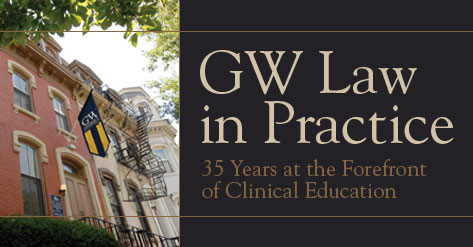
Now located at 2000 G Street, NW, across the street
from the Law School complex, the clinics started
in three rooms of now-demolished Bacon Hall. At
one time, they were housed in Stockton Hall.
Claire Duggan
By Jamie L. Freedman
For 35 years, GW Law has provided
effective legal services to the Washington community
and beyond through the Jacob Burns Community Legal
Clinics. Through strong faculty leadership and
skillful student participation, the program has
grown steadily into uncharted legal and research
territories. Today, it boasts several unique clinics
that make an international impact felt by thousands
of clients each year. Programs including vaccine
injury, mediation, and small business clinics
were either pioneered by or can only be found
at GW Law.

|
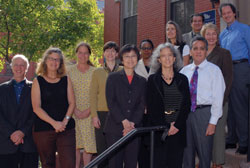
Experienced faculty
members guide GW Law’s clinical programs.
From left to right, back row: Peter Meyers,
Mary Clark Brittingham, Anne Oleson, Suzanne
Jackson, Susan Jones, Jennifer Lyman, and
Arturo Carrillo. From left to right, front
row: Carol Izumi, Joan Meier, Alberto Benitez,
Joan Strand, and Jeffrey Gutman.
Claire Duggan
|
“GW Law has long been at the vanguard of
clinical education,” says Carol Izumi, associate
dean for clinical affairs and professor of clinical
law, who has overseen the operation since 2003.
“We were one of the first law schools in
the country to have a mediation, small business,
immigration law, and international human rights
clinic, and are still the only school with a vaccine
injury clinic.”
During her 20 years at the Law School, Izumi
and her colleagues have helped students work with
clients to achieve legal victories. The students
gain invaluable practical experience, clients
gain much-needed advice—and faculty members
guide the process.
Professor of Law Eric S. Sirulnik, LLM ’70,
a clinical legal education expert, took the reins
of GW Law’s fledgling enterprise in 1972.
He has guided it through three decades of growth.
During his 31 years as director of the clinics,
Sirulnik oversaw the program’s ascent to
one of the largest and most highly regarded clinical
programs in the nation. “It was quite a
challenge to legitimize clinical law, which, for
many years, was the stepchild of the Law School,”
Sirulnik says. “In the early days, we operated
entirely on soft money, and I continually fundraised
for grants to keep the clinics running.”
The uphill battle has been worth it for Sirulnik,
who describes himself as a product of late 1960s
social activism. As a public interest lawyer,
he is inspired by the concept of legal services
helping people. “I thought, ‘If I
can handle 100 cases a year, just imagine the
impact of training 100 others to do the same,”
he says.
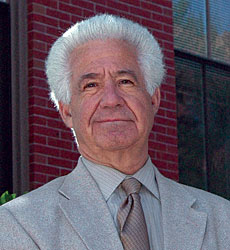
Eric Sirulnik, founding director of GW Law’s
clinical programs
Jessica McConnell
|

|
GW Law’s clinical program began modestly—in
three small rooms on the third floor of the long-demolished
Bacon Hall. Staffing was likewise humble: Sirulnik,
a part-time Job Corps secretary, and a few students.
“The first year, we were so tiny that I
lent one of our offices to John Banzhaf, who needed
the space.” As grants started coming in,
Sirulnik hired two full-time supervising attorneys
in 1973, followed by another three lawyers. Early
on, he also hired office manager Norma Lamont,
who continues to direct the operation’s
administrative efforts.
The clinics later took over the first floor of
Bacon Hall, then moved to a suite in Stockton
Hall, and, in the 1990s, to their current home
at 2000 G Street, NW, across the street from the
Law School complex.
Initially, clinic projects focused on environmental
and civil rights litigation and direct legal services
for low-income clients, including income tax assistance
and consumer protection. As the clinics grew,
their mission increased in scope. Groundbreaking
courses were added, such as the Vaccine Injury
Clinic, Consumer Mediation Clinic, and, most recently,
the International Human Rights Clinic. The IHRC
allows GW Law students to contribute to the development
and protection of human rights around the world.
Today, GW Law boasts one of the most diverse
clinical offerings in the country, with nine clinics,
each led by a top-notch supervising attorney.
Clinical faculty members—whom Izumi calls
the “backbone of the enterprise”—cumulatively
train 200 law students annually and offer a broad
range of legal experience.
Civil and Family Litigation Clinic
Some have devoted decades to the operation, such
as Joan Strand, JD ’75, professor of clinical
law and former president of the D.C. Bar. A former
clinical student, Strand has directed the Civil
and Family Litigation Clinic since 1979. “When
I entered law school, I was interested in becoming
either a lawyer or a social worker,” says
Strand, who studied torts under Sirulnik. As a
3L, she participated in the D.C. Law Students
in Court Program, a clinic run by a consortium
of five local law schools, and was hooked.
Strand’s students are responsible for cases
involving divorce, custody issues, visitation,
and property issues, she says, “from the
time they interview their client and draft the
pleading to the moment they stand up in front
of the judge.”
Skillfully transferring legal theory into practice,
the students succeed in the courtroom. “Last
year, we helped a grandmother get legal custody
of a teenage child whose mother had a drug problem,
and finalized a divorce for a woman who had been
separated for 30 years,” says Strand. “We
just finished a case where a client regained custody
of her son after his father had taken him. It
was an uphill battle, but we won.”
Vaccine Injury Clinic
Like Strand, Peter H. Meyers, JD ’71, became
involved with the clinics as a student and went
on to make a name for himself in the field. An
experienced litigator, Meyers directed GW Law’s
Federal, Criminal, and Appellate Clinic from 1992
to 1993. He then engineered the Law School’s
expansion into new territory in 1994 with the
launch of the one-of-a-kind Vaccine Injury Clinic.
“Our students represent the families of
young children and adults who are seeking compensation
for vaccine-related injuries and death under the
National Childhood Vaccine Injury Act of 1986,”
explains Meyers, who established the clinic with
Sirulnik in response to suggestions by several
judges on the U.S. Court of Federal Claims. “We’ve
obtained substantial settlements for our clients
in a wide variety of cases, through negotiation
and litigation, ensuring that people with severe
vaccine-injury related mental and physical disabilities
receive excellent care for the rest of their lives.”
In one of the clinic’s most memorable victories,
students won a multi-million dollar settlement
for a client in Iowa whose 10-year-old daughter
suffered brain damage and a seizure disorder resulting
from a government-mandated measles, mumps, and
rubella vaccination. The settlement allowed for
greater accessibility to the client’s house,
round-the-clock nursing and medical care, and
the client to live at home with her family.
Meyers’ students take on “the cutting-edge,
difficult cases that other lawyers won’t
take.” He explains: “When the Hepatitis
B vaccine was added to the Vaccine Injury Act,
our students took on some of the earliest, precedent-setting
cases.” In the first case to be brought
under the act, the clinic negotiated a substantial
settlement for an emergency medical technician
who suffered serious nerve damage after getting
the Hepatitis B shot and couldn’t work in
her field anymore. “The settlement allowed
her to go back to school, start a new life, and
pay her medical expenses, establishing a great
baseline for future cases,” Meyers says.
Small Business Clinic
Another GW Law “first” is the Small
Business Clinic, established in 1977 as the premier
clinic in the country devoted to providing free
start-up legal services to Washington-area entrepreneurs,
nonprofit groups, and arts organizations. Since
1988, Susan R. Jones, chair of the clinical section
of the American Association of Law Schools, has
led the enterprise.
At the beginning, “people just didn’t
see the connection between business clinics and
social justice,” Jones says. “As small
business law expanded over the years into a ‘legitimate’
part of the public interest movement, there’s
been a huge proliferation in the number of small
business clinics nationally, and GW Law has served
as a model for many of them.”
GW’s clinic, launched as the local legal
specialty center for the Small Business Administration’s
Small Business Development Program, represents
micro-businesses with start-up capital of $500
to $35,000. “I love walking around town
past the businesses and dance and theater companies
we’ve helped to launch, and seeing where
we’ve made a difference,” Jones says.
Recently, that work has expanded to include community
economic development efforts in sections of Washington
undergoing revitalization. This is an ideal venture
for Jones, who is vice chair of the D.C. Bar’s
Community Economic Development Pro Bono Project.
One of the clinic’s most rewarding cases
this year involved assisting an entrepreneur interested
in opening a Maui Wowie smoothie stand at Dulles
International Airport. “The airport has
a plan for working with economically disadvantaged
entrepreneurs, and this gentleman came to us for
help reviewing contracts and going over the very
complicated, 120-page lease from Dulles,”
she explains. “When I was at the airport
this summer with my nieces, it was a great feeling
to look across and see the smoothie stand and
know that our students played a role in making
it happen.”
Immigration Law Clinic
Alberto M. Benitez, who has led GW Law’s
Immigration Law Clinic since 1996, also has witnessed
tremendous growth in his clinical field. Established
in 1979, the clinic has an outstanding reputation
in Washington for defending the rights of resident
aliens. “Despite the abundance of lawyers
in the United States, there is a critical shortage
of competent immigration lawyers,” Benitez
says. “Over the years, clinic students have
developed an expertise in representing aliens
in removal proceedings, dramatically increasing
their clients’ odds of remaining lawfully
in the United States.” Benitez’s students
also have won cases involving controversial issues
such as female genital mutilation, torture, and
HIV-status, and have obtained freedom from detention
for aliens.

|
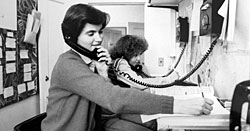
For 35 years, students
have supported the clinics through countless
hours of research, client interaction, and
advocacy. In turn, they gain invaluable
practical experience.
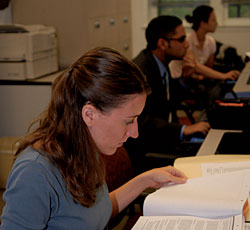 Jessica McConnell
Jessica McConnell
|
“Our clinic specializes in preventing aliens’
removal from the country, and our students are
very good at it,” says Benitez. “In
immigration law, the bureaucracy is so vast and
overwhelming that it often seems insurmountable.”
The clinic secured a huge victory in August, when
an out-of-status alien who had been in the United
States since 1988 became a lawful permanent resident.
“He’d been working menial jobs all
these years, with no real security, and now he’s
out of the shadows and legal,” Benitez says.
Like many of his colleagues, Benitez keeps in
touch with students after they graduate. “I’m
always getting e-mails and phone calls from former
students telling me what’s going on in their
lives,” he says, noting that he had lunch
with seven law clinic alumni during a recent trip
to Chicago.
Consumer Mediation Clinic
Izumi says it is an honor to watch students develop
their skills through the clinics. “Over
the course of a semester, you can see tremendous
development in our clinical students’ confidence,
skills, poise, and professionalism.”
She heads the Consumer Mediation Clinic, the
oldest law school mediation program in the country;
it was the only one of its kind in Washington
for 20 years. The clinic helps consumers and businesses
resolve disputes by crafting mutually agreeable
settlements. “GW Law School embraced alternative
dispute resolution early on,” Izumi explains.
“For many years, we were the only law school
clinic that gave students a chance to work with
people as neutral mediators rather than as legal
representatives.”
The clinic, which receives several hundred requests
for mediation assistance from local consumers
each year, added a new component in 2000—the
Community Dispute Resolution Center Project, where
students mediate misdemeanor cases referred by
the U.S. Attorney’s Office. “It’s
a unique program in the country,” says Izumi,
who has chaired the American Association of Law
Schools Sections on Alternative Dispute Resolution
and on Clinical Legal Education.
International Human Rights Clinic
Another groundbreaking program is GW Law’s
International Human Rights Clinic—the newest
clinic in the program and one of the few clinics
in the country dedicated to litigating human rights
cases before U.S. and international tribunals.
“We debuted on the big stage,” says
founder and director Arturo Carrillo, JD ’91.
“During our inaugural semester in spring
2004, our students were members of the legal team
that briefed and argued the seminal case of Sosa
v. Alvarez Machain before the U.S. Supreme
Court. Last year, clinic student Lina Fattom,
JD ’05, participated in a first-of-its-kind
international arbitration hearing before the Ethiopia-Eritrea
Claims Commission at The Hague, The Netherlands.”
Other IHRC highlights include a case brought
on behalf of Guantanamo Bay detainees that went
to the U.S. Supreme Court and preparation of an
amicus brief on behalf of 20 U.S. law professors
in support of extradition proceedings in Chile
against Alberto Fujimori, former dictator of Peru.
Federal Criminal and Appellate Clinic
“Meeting your client in prison really brings
home the meaning of ‘representation,’”
says Jennifer Lyman, co-director of GW Law’s
Federal Criminal and Appellate Clinic along with
Anne Olesen. Since the early ’90s, the clinic
has represented indigent clients on appeal and
in state post-conviction proceedings in serious
felony cases. Olesen and Lyman emphasize that
each student handles a whole case as lead counsel—from
opening brief through court decision.
FCAC students recently won a new trial for a
client under a 10-year mandatory sentence in a
drug case. While the trial prosecutor admitted
the key police witness was unreliable, the appellate
court only reversed because the trial judge refused
to ask potential jurors a question exposing their
biases about drug use.
“Even clients facing life sentences seek
out student lawyers for their energy and commitment,”
says Olesen.
Public Justice Advocacy Clinic
Class-action litigation is the focus of GW Law’s
Public Justice Advocacy Clinic, directed by Jeffrey
Gutman. “Our students have litigated and
successfully settled cases challenging the D.C.
Public Schools’ failure to have emergency
evacuation plans for mobility impaired students
and a D.C. agency’s policy of terminating
foster care benefits without notice,” says
Gutman, who co-founded the clinic in 2001.
A student-led class-action suit challenging the
D.C. Jail’s practice of holding some prisoners
beyond their release dates and performing illegal
strip searches was resolved through settlement.
The PJAC also is serving as co-counsel for plaintiffs
in class action cases aimed at reforming the D.C.
Disability Compensation program termination policies
and seeking to secure special education services
for disabled preschoolers in Washington. The clinic
also has been successful in securing partnerships
with private law firms and public interest organization
to help with cases.
Health Rights Law Clinic
Large numbers of low-income Washingtonians benefit
from the Health Rights Law Clinic, created in
1995 to help residents resolve disputes with public
health programs, private health insurance companies,
and medical providers. Each year, the clinic serves
more than 4,000 community members through direct
legal services, counseling, and information sessions.
“Student advocates have helped countless
seniors and people with disabilities escape from
crushing debts for health care, some big, some
small, none insignificant to the people whose
problems were solved,” says Suzanne Jackson,
director of the clinic. “Our students are
honing their lawyering skills in this area of
rapidly growing national importance.”
Domestic Violence Project
Also under the clinical umbrella is the Domestic
Violence Project, directed by Joan S. Meier, a
nationally recognized expert on domestic violence
and the law whose domestic violence clinics at
GW Law have been recognized by the U.S. Department
of Justice as leading national models. “The
Domestic Violence Project is the third of a series
of new models for teaching about domestic violence
in the clinical setting,” says Meier, who
previously founded and directed the Domestic Violence
Litigation Clinic and the Domestic Violence Emergency
Department Clinic. “In this new program,
students work as domestic violence advocates with
public interest and pro bono lawyers in the field,
providing them with the opportunity to help prepare
domestic violence cases for trial, work on legislative
and policy reforms, and experience what it’s
like to be a real-world domestic violence lawyer.”
Meier, who founded the non-profit Domestic Violence
Legal Empowerment and Appeals Project, has involved
her students in Supreme Court and other appellate
court litigation. Last year, Rebecca Hoffman,
JD ’06, wrote a key part of a Supreme Court
brief that had an impact on the court’s
decision in Davis v. Washington—resulting
in a significant victory for victims of abuse.
Lissa Percopo, JD ’07, who as a student
spent a year as an intern in the U.S. Attorney’s
Office, was the first student to receive a Victim’s
Service Award in recognition of outstanding field
work and two class projects she designed that
provide information and support to victims and
to other interns.
In addition to honing professional skills, Meier
says her students are “developing their
sense of the realities of domestic violence law.”
Experience in Action
Faculty members and students involved with the
clinics are eager to turn support they gain from
the GW Law community and external sources into
further growth and action. “We’ve
never been content just to maintain the clinics,”
Izumi says. To aid that effort, funds from donors
ensure that GW Law stays at the forefront of clinical
legal education, including a $2.4-million cy press
award from attorney Phil Friedman and a $2-million
pledge from the Jacob Burns Foundation to endow
a clinical faculty chair.
Dean Frederick M. Lawrence says the clinics are
a point of pride for the Law School and will continue
to be so in the future. “I am delighted
to congratulate the GW Law Clinics on providing
35 years of exceptional legal service to the Washington
community,” Lawrence says. “We have
been blessed with dedicated faculty and with committed
students, who come to understand that public interest
is not just a branch of law, it is a way of life,
incumbent upon all lawyers in our society. I look
forward to all that can yet be accomplished in
this extraordinarily important part of our legal
education program.”
|